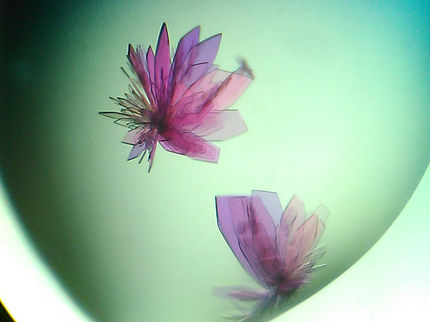Dead on Target: Multifunctional nanoparticle platforms for targeting and imaging cancer cells
Advertisement
There has been much recent interest in how nanotechnology will impact the field of medicine. Unfortunately, a number of promising nanostructured systems have turned out to be extremely toxic to humans, thus precluding their use in clinical applications and dashing hopes of an early success for the interdisciplinary field of nanobiotechnology. Now a group of researchers at the University of Michigan Nanotechnology Institute for Medicine and Biological Sciences have devised a multifunctional nanoparticle platform comprising nanoparticles synthesized within dendrimers equipped with targeting molecules and dyes. These dendrimer nanoparticle systems are able to seek out and specifically bind to cancer cells.
Xiangyang Shi, Suhe Wang, James R. Baker Jr., and their colleagues have designed dendrimer nanoparticle systems that are stable, water soluble, and biocompatible. The researchers start out by synthesizing gold nanoparticles within amine-terminated dendrimers. Next, dye molecules and a targeting molecule, folic acid, are attached to the ends of the dendrimers. Finally, the remaining amine groups are acetylated to ensure that the complex particles do not bear any surface charges. This last step is especially important to ensure the biocompatibility of these systems and to prevent the nonspecific adhesion of other materials. Molecular dynamics simulations indicate that the folic acid attachments project out into the solvent and are readily available for binding to cells, whereas the dye molecules stay far removed from the metal nanoparticles and thus retain their bright fluorescence.
Many cancer cells, including those implicated in cancers of the ovary, kidney, uterus, testis, brain, colon, and lungs, tend to overexpress folic acid receptors. Owing to the folic acid attachments grafted onto the dendrimer nanoparticles, the dendrimer nanoparticles are seen to latch onto the cancer cells via these folic acid receptors. Since the dendrimer nanoparticles are also equipped with dye molecules, the high concentrations of nanoparticles accumulated in the cancer cells can be imaged by confocal microscopy, and indeed diseased cells can be easily told apart from healthy cells. Further verification comes from electron microscopy experiments. The high contrast provided by the gold nanoparticles allows the determination of the specific sites in the cell machinery where the nanoparticles are attached. Shi pointed out that it should be possible to design dendrimer nanoparticles with other biological ligands such as proteins and antibodies to image and target various biological systems.
"Beyond imaging, it may also be possible to specifically target and destroy cancer cells that internalize the nanoparticles by applying laser heat that intensifies in the presence of gold nanoparticles", said Wang. "Another possibility is the attachment of drug molecules to these dendrimer nanoparticle systems", added Baker, "since this will allow the direct delivery of drugs to the target cells". The researchers are currently conducting further in vivo experiments to evaluate the suitability of this system for clinical applications.
Original publication: Xiangyang Shi et al.; "Dendrimer-Entrapped Gold Nanoparticles as a Platform"; Small 2007, 3, No. 7, 1245-1252.
Other news from the department science
Most read news
More news from our other portals
See the theme worlds for related content
Topic world Antibodies
Antibodies are specialized molecules of our immune system that can specifically recognize and neutralize pathogens or foreign substances. Antibody research in biotech and pharma has recognized this natural defense potential and is working intensively to make it therapeutically useful. From monoclonal antibodies used against cancer or autoimmune diseases to antibody-drug conjugates that specifically transport drugs to disease cells - the possibilities are enormous

Topic world Antibodies
Antibodies are specialized molecules of our immune system that can specifically recognize and neutralize pathogens or foreign substances. Antibody research in biotech and pharma has recognized this natural defense potential and is working intensively to make it therapeutically useful. From monoclonal antibodies used against cancer or autoimmune diseases to antibody-drug conjugates that specifically transport drugs to disease cells - the possibilities are enormous























































